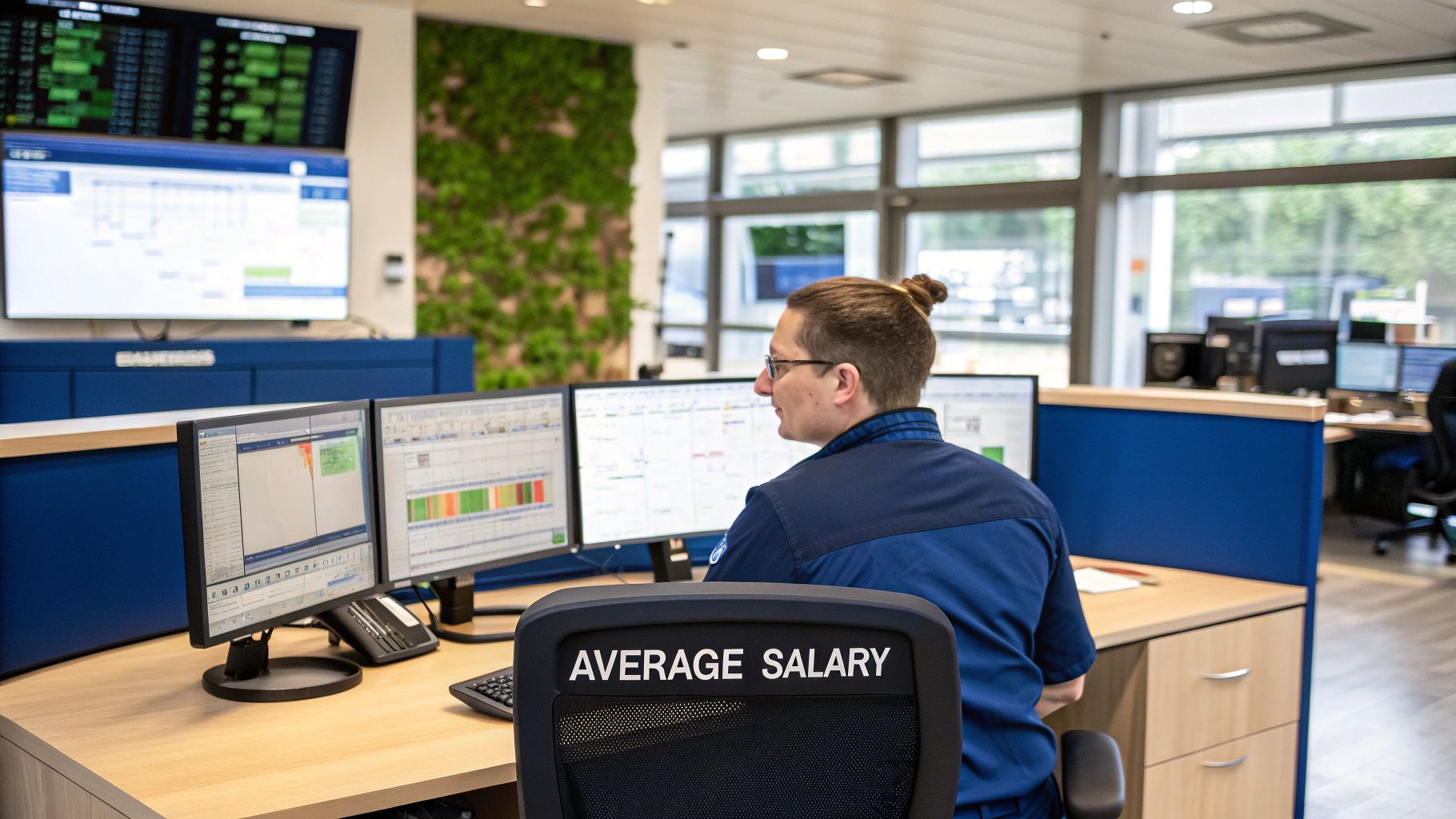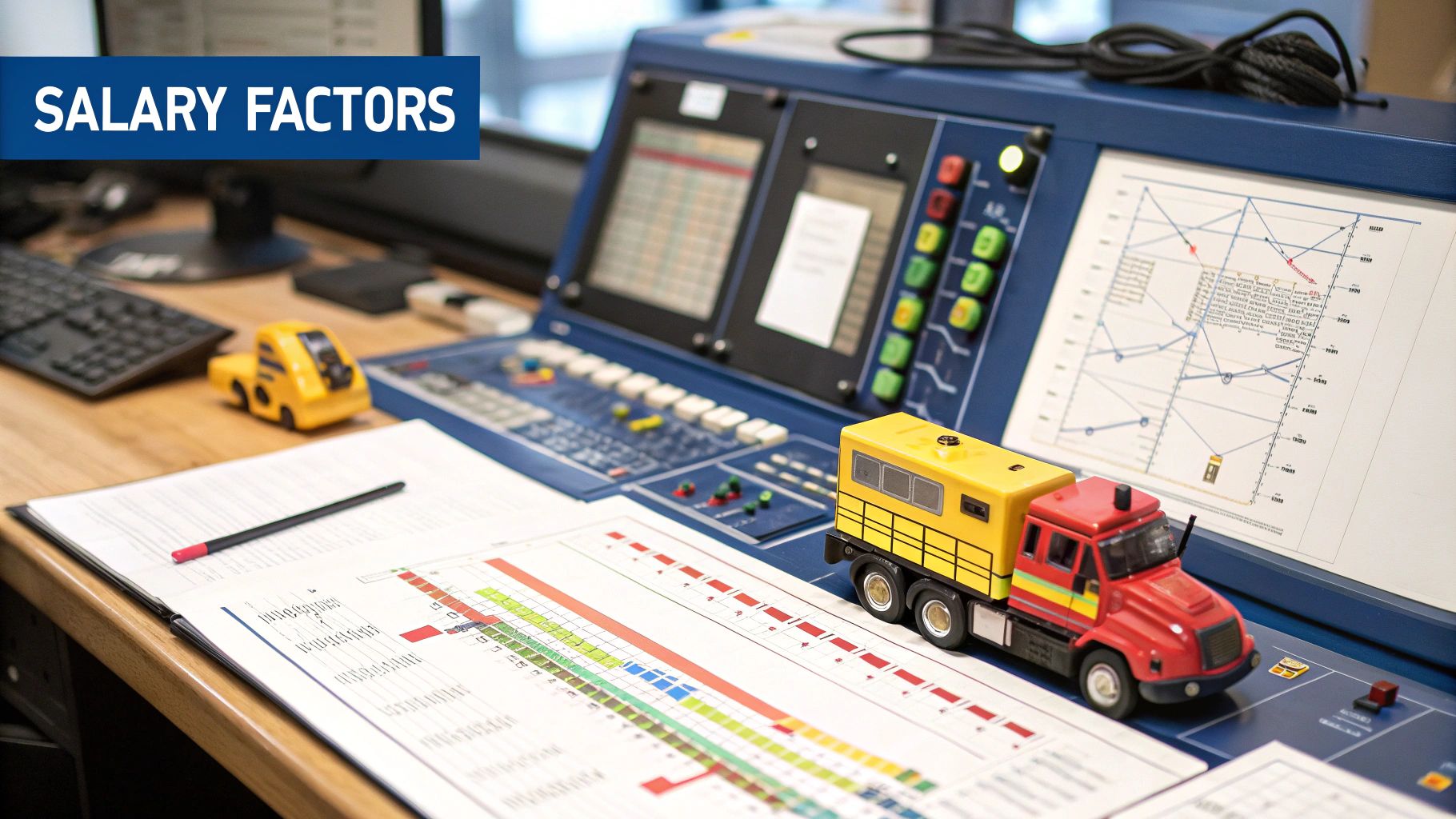Salary for Trucking Dispatcher in 2025: What You Can Expect
So, you're thinking about being a trucking dispatcher and want to know what the pay is. Let's talk numbers. Trucking dispatcher makes about $64,000 a year in 2025.
What Trucking Dispatchers Actually Make
When you're looking at a new job, pay is a big deal. It's not just one number, either. Your pay as a dispatcher can change a lot. It depends on where you live, how much experience you have, and the company you work for.
The national average is a good place to start. Data shows a typical U.S. truck dispatcher makes $59,972 a year. That means you could earn about $4,998 a month before taxes. This is a common number, but plenty of dispatchers earn more. New folks might start with less.
Paycheck Breakdown
To give you a clearer picture, let's break down the average pay.
Trucking Dispatcher Salary Quick View
Here’s a simple look at how the average salary for a trucking dispatcher breaks down.
This table gives you a quick look at typical pay. But remember, overtime, bonuses, and commissions can add to your total pay.
It’s smart to see how this job compares to others in trucking. For example, check out our guide on the average salary for a trucker to see how the numbers compare.

How Experience Level Changes Your Pay
Just like with driving, a dispatcher's pay goes up with time and skill. The more you know, the more you're worth. Think of it like moving up in pay as you get better at your job.
When you're just starting out, you're at the entry-level. This is where you learn the basics. You'll build relationships with drivers and get used to the job. Your pay shows you're still learning.
After a few years, you’ll be in the mid-career group. By now, you're not just reacting, you're thinking ahead. you can solve problems fast and handle tough situations. You've proven you can keep trucks loaded and moving. That experience makes you more valuable, and your paycheck will show it.
Key Takeaway: Your starting pay is just that—a start. After a few years of good work, a dispatcher can see a big jump in pay as they get more skilled.
From Beginner to Pro Pay
Finally, you have the senior-level dispatchers. These are the pros who can handle complex plans like it's easy. They help new hires and fix the toughest problems. They are often the glue that holds the whole operation together. Their pay is at the top because they are essential.
How Your Location Affects Your Salary
When it comes to a dispatcher’s pay, location is everything. It's that simple. A job in a big city like Chicago will almost always pay more than the same job in a small town.
So, why the big difference? It comes down to two things.
First, big cities cost more to live in. Companies have to pay more to get and keep good people. Second, these cities have a lot of freight moving through them. That means more demand for good dispatchers, and that competition drives pay up.
Top Paying States for Dispatchers
If you want the biggest paycheck, some states pay more than others. It's no surprise these places are also big for shipping.
Here’s a quick look at a few of the top-paying states for truck dispatchers:
- Illinois: Chicago is a huge freight hub for the whole country. The demand here keeps pay strong.
- Georgia: Atlanta is a key spot for the Southeast. Good dispatchers are needed and paid well.
- Texas: Big hubs like Dallas and Houston have tons of trucking companies. This competition raises pay.
- California: Thanks to its huge ports and high cost of living, dispatcher pay here is some of the best.
It's important to remember that a higher salary often comes with a higher cost of living. Just like with a driver's pay, what really matters is how much money you have left after bills. Our guide on the average trucker salary across the U.S. can give you more info on how location affects your take-home pay.

Hourly Pay Versus Annual Salary
When you look for dispatcher jobs, you'll see two types of pay: hourly or a yearly salary. You need to know the difference to figure out what's best for you. Each one has good and bad points.
With an hourly wage, you get paid for every hour you work. If a snowstorm hits and you have to stay late, all that extra time shows up on your check. This can be a great way to make more money during busy weeks.
On the other hand, a yearly salary gives you a steady paycheck you can count on. Knowing exactly how much money is coming in makes it easier to budget.
The biggest downside to a salary is working extra hours without extra pay. If a 40-hour week turns into a 50-hour week to handle a problem, your paycheck stays the same.
Choosing Your Pay Style
So, which one should you choose? There’s no single right answer. It all depends on what you like.
- Hourly Pay: This is best if you want to be paid for every minute you work, especially if you think you'll work overtime.
- Annual Salary: This is great if you like steady pay you can plan your budget around.
Data shows the average hourly pay for a truck dispatcher is around $22.03. But that's just an average. The pay can be anywhere from $11.30 to over $33.89 an hour. It depends a lot on where you live and how much experience you have. For a closer look, you can see how hourly wages for dispatchers vary on ZipRecruiter.com.
No matter what, always read the job offer carefully so you know exactly how you'll be paid.
Key Skills That Boost Your Dispatcher Salary
Where you live and how long you've been on the job are big parts of your pay, but not the whole story. The skills you have can really raise what you earn as a trucking dispatcher. It's all about making yourself essential.
For example, getting really good with certain software is a huge plus. Almost every carrier uses a Transportation Management System (TMS). If you’re a pro with a popular one like McLeod or TMW, you're much more valuable.
Another big plus is speaking a second language. Being fluent in Spanish, for example, lets you talk to more drivers. For companies with diverse teams, that's a key skill.
Company Size and Pay Structure
The type of company you work for also affects your pay. A job at a huge national carrier often comes with a higher base salary and good benefits. A smaller, family-owned company might offer a better work-life balance or performance bonuses.
This is where bonuses and commission can really change the game. Many dispatch jobs aren't just about the base pay. They often include bonuses based on your performance.
What does this mean for you? Your hard work turns directly into more money. When you work smart, keep your drivers happy, and cut down on empty miles, you'll see it in your paycheck.
Let's break down the top things that give you a bigger paycheck.

Top Factors That Increase Dispatcher Pay
While experience is always important, certain skills can give your salary a big lift. Here’s what companies will pay more for.
Focusing on these areas makes you a more skilled dispatcher, which almost always leads to better pay.
How to Ask For and Get a Higher Salary
Knowing what you're worth is one thing. Actually getting paid that much is another. Let's go over some simple tips for getting a better salary. Whether you're starting a new job or asking for a raise, a little prep work helps a lot.
First, do your homework. Use the numbers from earlier in this guide—the average pay in your state and for your experience level. This gives you a solid number to aim for. You can't just walk in and say you "want more money." You need to show them why you've earned it.
Building Your Case
When you sit down to talk, you need to bring facts, not just feelings. Think about all the ways you help the company make money or save them from big problems.
Here’s what you should have ready to talk about:
- Your Successes: Have you kept your drivers’ empty miles low? Did you reroute a load during a storm, saving the delivery? Write these examples down.
- Your Skills: Are you the expert on the company’s TMS software? Are you bilingual? Remind them how your skills make things run better.
- Your Value: Show them the numbers. Point to better on-time delivery rates or how you’ve built good relationships with drivers and customers. These things have real value.
Pro Tip: Timing is everything. The best time to ask for a raise is right after a big win—like getting a good new lane—or during your yearly review.
What to Say
Be confident, but don't be demanding. A good way to start is by saying you'd like to talk about your pay and your future with the company.
Frame your request around your work and the value you bring. For example, you could say, "Based on my work over the last year, like cutting empty miles by 15%, and looking at the market rate for dispatchers like me, I believe a salary of [Your Target Number] is fair." It also helps to know how driver pay works. You can get a better sense of that by checking out how much truck drivers make.

Ready to start your journey in the trucking industry? Whether you're aiming to be a driver or a dispatcher, it all starts with the right training. ELDT Nation provides FMCSA-approved online ELDT courses to help you get your CDL permit fast. Learn more and get started today!



%20Endorsement%20%E2%80%93%20Online%20Theory%20Aligned%20With%20FMCSA%20Rules.jpg)



